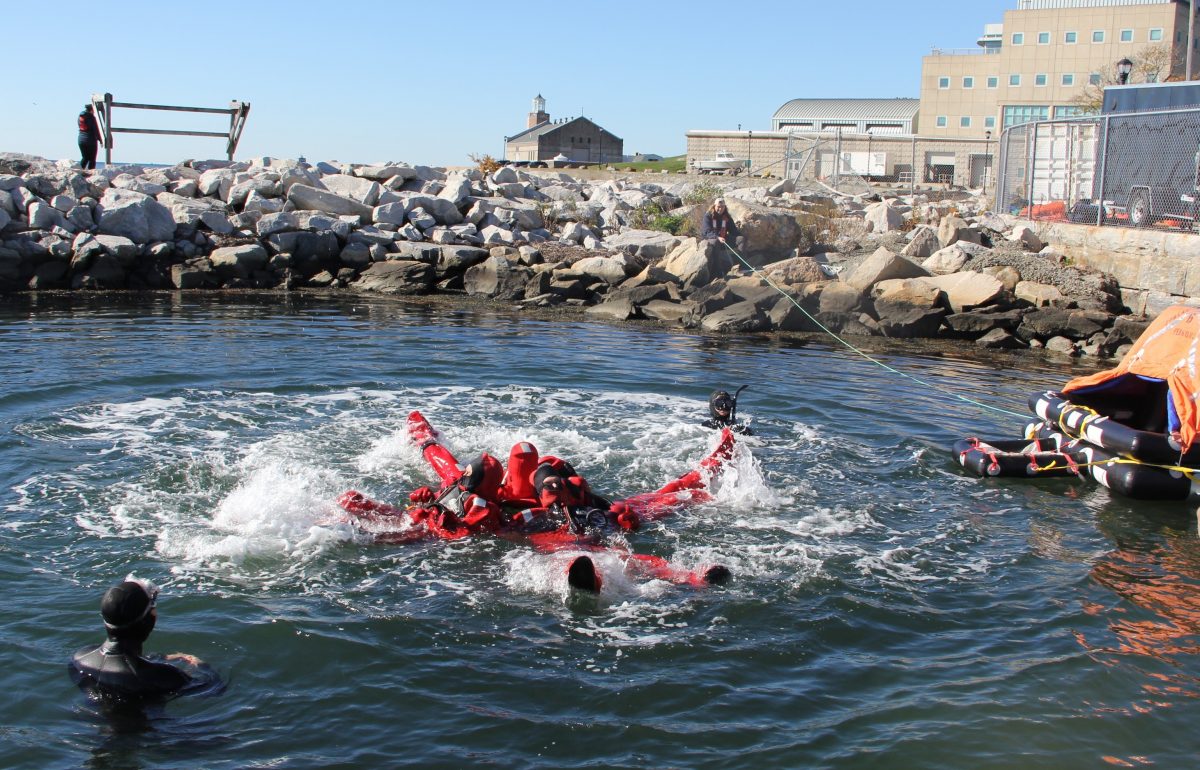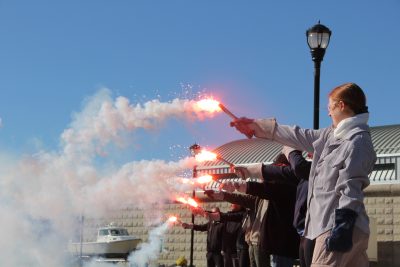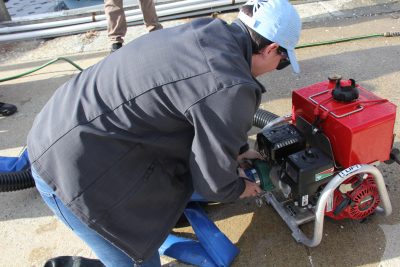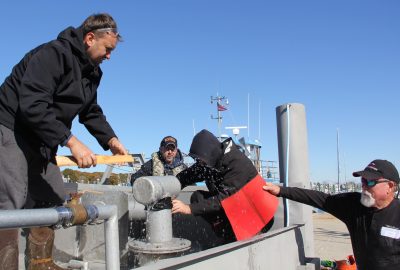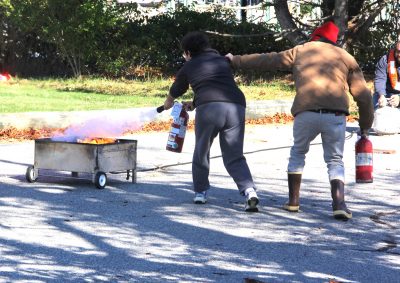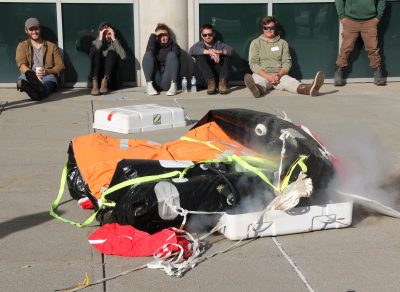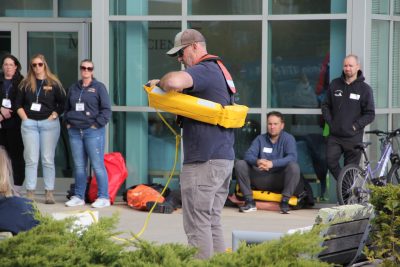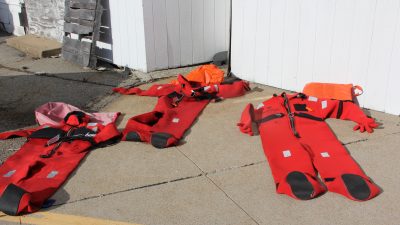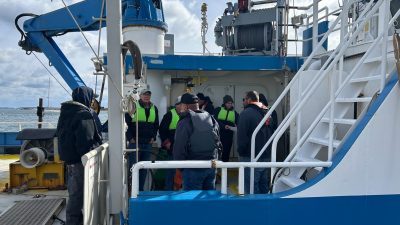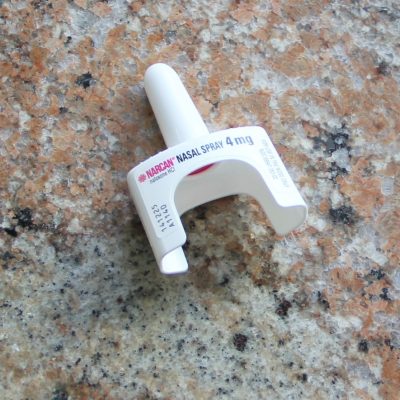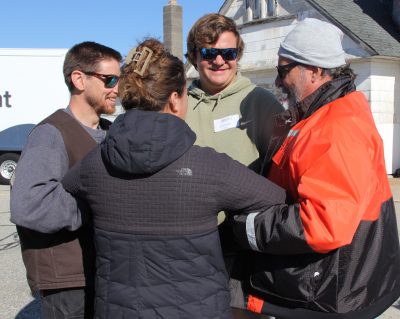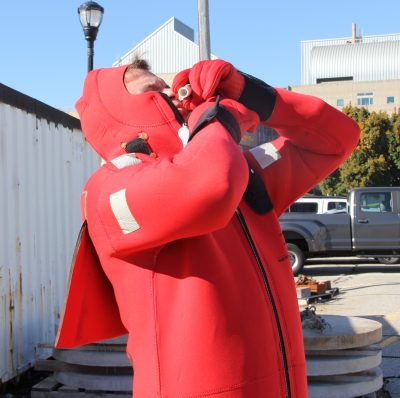Story and photos by Judy Benson
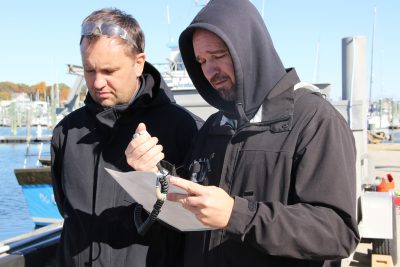
Pavel Ivanov has spent many hours harvesting surf clams and ocean quahogs aboard the F/V Sea Watcher II out of New Bedford, Mass., but had never practiced getting into an immersion survival suit or boarding a life raft before coming to UConn Avery Point for a sea safety workshop.
“I’m trying to do some trips working with the wind farms, and they require taking this course,” he said.
Another student in the workshop was Emilie Waters, who captains an oyster boat for Thimble Islands Shellfish in Branford.
“We have all the safety gear,” she said, “but it’s not necessarily in all the right places, or getting inspected regularly.”
Ivanov and Waters were among 27 students in the Fishing Partnership Safety & Survival Training at Avery Point Oct. 27 and 28. Others included fishermen, marine researchers, state environmental and aquaculture bureau staff who work on vessels, and Dominion Millstone Power Station environmental specialists who conduct marine surveys.
“I started driving the boat recently, so this is really important for me,” said Brooke Winsmann, who works in the environmental lab at Millstone.
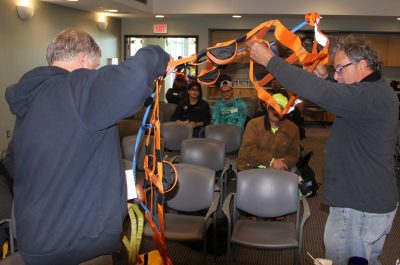
The course started at Avery Point in 2001 through a partnership of Connecticut Sea Grant and the Coast Guard’s Sector Long Island Sound office and has been offered about every two years since. In 2016, Fishing Partnership Support Services of Gloucester, Mass., which runs workshops from Maine to North Carolina, joined the program to provide instructors with first-hand experience as commercial fishermen, marine surveyors and Coast Guard personnel. Commercial fishing vessels are required to do on-board safety drills monthly, led by one of the crew members who has been trained as a drill instructor, but a focused course like this one provides invaluable reinforcement.
“One of Connecticut Sea Grant’s objectives is to support the development of a trained workforce,” said Nancy Balcom, Connecticut Sea Grant associate director and an original organizer of the training program. “Given that commercial fishing is one of the most dangerous occupations to have, it was important to find ways to offer commercial fishermen in Connecticut the opportunity to learn and practice safety and survival skills in a non-crisis situation, free of charge.”
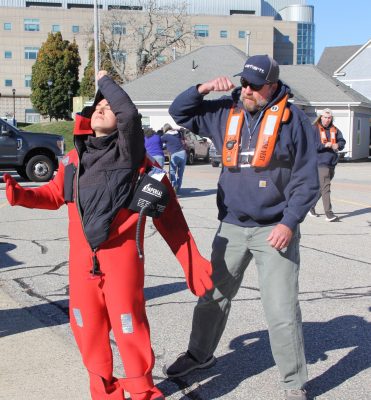
The Partnership instructors, she said, enhance the training through their extensive knowledge of state-of-the-art gear and in-depth training programs, helping to build a culture of safety among commercial fishermen and others who work on the water.
The first day of training started in the classroom with lessons on different types of personal flotation devices (PFDs), man overboard procedures, making mayday calls and administering Narcan to avert an opioid overdose emergency at sea. Each student received four doses of Narcan from the Partnership.
“Fishermen are seven times more likely to die from an opioid overdose than workers in other fields,” Judi Keding of Fishing Partnership told the class.
Next the students headed outdoors for some dramatic exercises—putting out fires, setting off handheld flares and smoke flares, learning how to fix leaks and swimming to a life raft in an immersion suit.
“You’ve got to practice it,” said Mark Bisnett, instructor for Fishing Partnership. “Just like if you were ever in a school orchestra or a sports team.”
The first day ended with a demonstration of how to deploy a life raft and different types of flotation devices used when someone goes overboard. On the second day, a smaller group of students seeking certification as drill instructors received classroom and on-board lessons on a UConn research vessel tied to a nearby dock.
“Who needs to do what in a man overboard drill?” Bisnett asked the class. “Who thinks they’re physically capable of being the rescue swimmer?”
Mark Pawlishen, Fishing Partnership lead instructor for the Avery Point workshop, said he became a trainer after 20 years as a marine surveyor took him aboard many fishing vessels. He has a personal connection to the industry, since his wife’s family owns commercial fishing boats in New Bedford.
“A lot of the fishing crews didn’t know a lot about safety,” he said. “There’s really a lot of need for this. I really love giving back to the fishermen.”
Balcom said she is sad to learn that Fishing Partnership recently lost significant federal funding that allowed them to provide the training free of charge.
“When lives are at stake,” she said, “the time to figure out how to address a fire on board, or retrieve a man overboard or having to abandon ship should not be in the middle of a crisis 100 miles offshore. The Partnership has numerous examples of dire situations at sea that have had positive outcomes due to fishermen having taken their training, practiced, and knew what to do when it really counted.”
